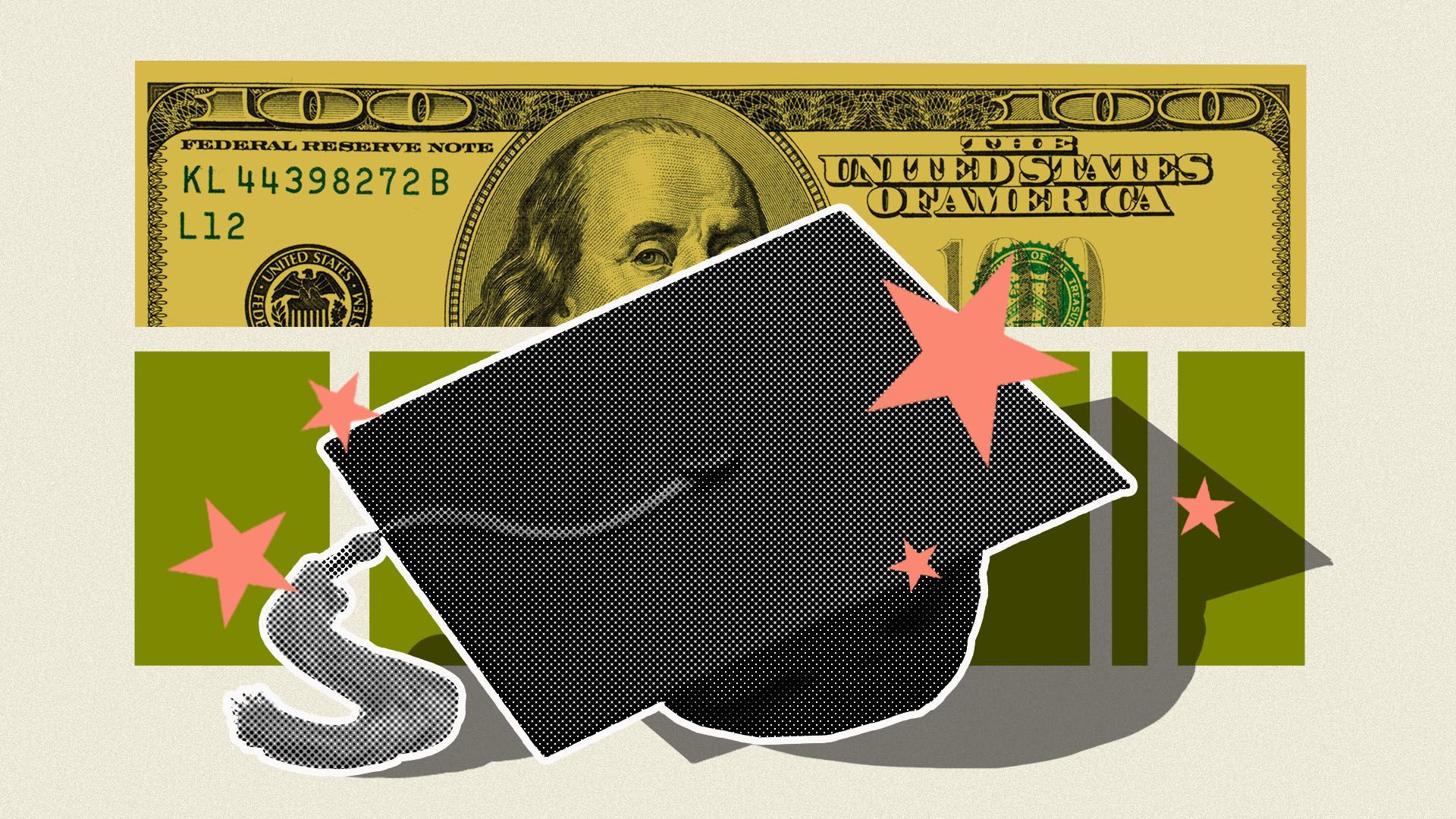| |
| |
| |
| Presented By Latham & Watkins |
| |
| Pro Rata |
| By Kia Kokalitcheva ·May 15, 2021 |
| Welcome to the middle of May — I can't decide if time is flying or moving in slow motion... - As always, feel free to send me tips or comments by replying to this email or on Twitter @imkialikethecar.
- Playing on my Spotify app: White Town's "Your Woman" and Selena's "Disco Medley" from her live album.
Today's Smart Brevity™ count is 806 words, a 3-minute read. |
| |
| |
| 1 big thing: The journey to an entrepreneurship visa |
 |
|
| Illustration: Sarah Grillo/Axios |
| |
| The Biden administration on Monday announced that it will fully implement the International Entrepreneur Rule (IER), an Obama-era program that lets certain foreign-born entrepreneurs stay in the U.S. for up to five years. Why it matters: The Department of Homeland Security estimates that once implemented, about 3,000 foreign entrepreneurs would qualify per year for the IER program, resulting in about 100,000 jobs being created over a decade. Big picture: Right now, immigrants who want to start a company in the U.S. have to retrofit visas to their personal situations and hope that immigration administrators approve. - Many who are already here under employer-sponsored visas like H1-B or the post-college extension (F1-OPT) apply for green cards to (hopefully) be able to start their companies.
- Some apply for the E2 visa, which requires the applicant to personally invest in the startup.
- Others make their case for an O1 visa — for an "individual who possesses extraordinary ability" — which is best known for helping musicians and actors.
- The ultimate goal is a green card — permanent U.S. residency — which comes with freedom for employment (short of some government jobs).
"Our portfolio founders come from 27 non-U.S. countries, [and] they've been on 12 different kinds of visas," says Unshackled Ventures partner Nitin Pachisia, whose firm exclusively backs foreign-born entrepreneurs and helps them with immigration. Meanwhile: Other countries like Canada have scooped up would-be U.S. immigrants by offering more straightforward visa programs for entrepreneurs. - Turkish-born Omer Kucukdere, co-founder of Nestpick, tells Axios he set up his company in Germany thanks to the European Union's Blue Card visa, and a number of his employees have also used it.
What's next: IER isn't a panacea for foreign-born founders because it gives DHS discretionary authority and is not a formal immigration status. - Only Congress can create an actual visa for entrepreneurs, like what's been proposed in something called The Startup Act.
The bottom line: The U.S. now has a clearer path for foreign-born entrepreneurs, but it's still not entirely clear. |
    |
| |
| |
| 2. The entrepreneur roller coaster |
 |
|
| Shoshana Gordon/Axios |
| |
| For Kesava Kirupa Dinakaran, an entrepreneur and Rubik's Cube prodigy from India, securing a coveted visa so he could stay in the U.S. to grow his startup meant two years of uncertainty. Why it matters: This is an all-too-common story. "It's truly living on the edge for two years," says Dinakaran, CEO of DigitalBrain, who has since secured an O1 visa and is hoping for a green card. - "I don't know if I'll be in the country next week, but if I close this customer this week, it'll make our company strong and my case stronger," he recalls thinking.
Bumps in the road are common: Mercury Technologies co-founder and CEO Immad Akhund spent months flying between the U.S. and the U.K. while waiting for an E2 visa tied to his first startup, only for that company to fold nine months after he got it, sending him back into the visa labyrinth. - He's now an American citizen, but both he and the co-founder of his second startup got rejected on their first try for O1 visas.
Between the lines: Many entrepreneurs go through an alphabet soup of visa approvals and rejections before securing a green card (if they're so lucky). These are only two of the dozens of similar public and private replies after I solicited immigration stories. The bottom line: The visa process isn't for the faint of heart. |
    |
| |
| |
| 3. The university effect |
 |
|
| Illustration: Sarah Grillo/Axios |
| |
| American universities are playing an increased role in bringing foreign-born entrepreneurs into the U.S., according to a new working paper for the National Bureau of Economic Research. Why it matters: "Immigrant founders coming for education are likely to start their companies in the state in which they were educated, especially states where they received their graduate education, leading to potentially large local economic benefits," write authors Natee Amornsiripanitch, Paul Gompers, George Hu, and Kaushik Vasudevan. Cartography: States like California, Massachusetts and New York have large concentrations of companies founded by foreign-born entrepreneurs who came to the U.S. for college. Thus those states reap the benefits. The bottom line: The authors note that attracting students is only part of the battle, given the lag between when entrepreneurs arrive in the U.S. and when they launch companies. In other words, intervening rules around things like visas are vital. |
    |
| |
| |
| A message from Latham & Watkins |
| Exit through the SPAC door |
| |
 |
| |
| These days, late stage startups need to prepare for multiple potential exits – including a de-SPAC. Free LathamDrive resources can help you prepare to exit gracefully. Check out Preparing for a de-SPAC and other resources on LathamDrive to help you maintain momentum. |
| |
| |
| 📚 Due Diligence |
- VCs, startup founders push to revive Obama-era immigration program (WSJ)
- Starting a U.S. company, but not in the U.S.: Foreign entrepreneurs in a bind (NBC News)
- The international experience of startup visas for immigrant entrepreneurs (NFAP)
|
    |
| |
| |
| 🧩 Trivia |
| Despite the lack of a visa for entrepreneurs, plenty of immigrants have founded companies that are now household names. - Question: Name the largest such company in the U.S., by market cap. (Answer at the bottom.)
|
    |
| |
| |
| 🧮 Final Numbers |
 Data: DHS and Wadhwa et al., "Then and Now: America's New Immigrant Entrepreneurs"; Chart: Will Chase/Axios Using data from DHS, the U.S. Census Bureau and industry-specific research, think tank New American Economy projected in 2018 that the IER program would lead to more than 46,000 jobs created in its third year, with at least the same amount in subsequent years for a decade. - Given DHS estimates that about 85% of IER companies would be in the tech and science fields, New American Economy projects that they would create more than 409,000 jobs over the program's first 10 years.
- Along with other qualifying companies, the program would generate a total of nearly 430,000 jobs over that same period.
|
    |
| |
| |
| A message from Latham & Watkins |
| Get your startup up to speed |
| |
 |
| |
| From formation to capital raising to liquidity events and beyond – Latham & Watkins understands the company lifecycle and we share our insights to keep your business moving forward. Check out LathamDrive's Insights to help you maintain momentum. |
| |
| 🙏 Thanks for reading Axios Pro Rata! Please ask your friends, colleagues and immigration attorneys to sign up. - On a personal note, as an immigrant myself (who got extremely lucky with the process): Immigration is foundational to American history and its success.
Trivia answer: Alphabet, co-founded by Russia-born Sergey Brin. |
No comments:
Post a Comment